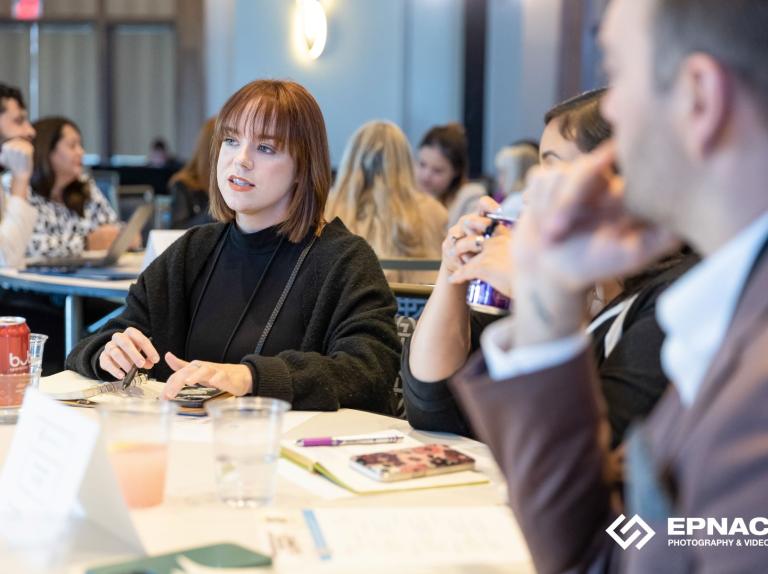
Houston First Corporation (HFC) partnered with the University of Houston to bridge the gap between academia and the DMO industry. By offering hands-on experiences and real-world projects, HFC is inspiring the next generation of tourism professionals and ensuring a strong future for the DMO sector.
Engaging the Next Generation for a Stronger Tourism Industry
In Houston First Corporation’s (HFC) pursuit of fostering new talent and expanding knowledge about the DMO sector, they recognized a crucial gap: many young professionals, even those in related fields like hospitality and marketing, are unfamiliar with the world of destination organizations. To bridge this gap, HFC launched an initiative with the University of Houston, specifically targeting students unaware of the DMO career path. This initiative created a valuable community connection and opened the door for students to explore an exciting and vibrant industry.
A Unique Opportunity for Students
The partnership began organically when HFC hired a graphic designer who then collaborated with the convention sales team on various projects. Reflecting on her experience, the designer often commented, “I wish I had been exposed to this in undergrad." Like many students entering the workforce, the understanding was primarily rooted in hotels and restaurants, sectors commonly associated with hospitality studies. The realization that many students were not being exposed to destination organizations prompted Houston First to think more strategically about engaging with the next generation of professionals.
HFC saw this as an opportunity to form a stronger relationship with the University of Houston. Specifically, they engaged the University of Houston’s Graphic Design Program to establish a direct line of communication with students who had the potential to enter the tourism and hospitality industry. By doing so, they ensured that students would learn about the DMO landscape and have hands-on experience working on real-world projects.
Hands-On Learning: Bid Books and Beyond
One of the most significant outcomes of the partnership was the introduction of project-based learning. HFC tasked the students with creating bid books for Requests for Proposals (RFPs). This was not a simple academic exercise; it was a real-world challenge that would be presented to the HFC staff. The students had to develop professional-grade materials, sharpen their presentation skills, and better understand the DMO's role in securing significant events and conferences for the city.
For many students, this was their first encounter with the DMO industry. This experience was transformative in showing them the breadth of opportunities beyond traditional hospitality roles; working on bid books exposed students to the intricacies of marketing, business development, and the behind-the-scenes work that makes large-scale events successful. It also allowed them to interact with professionals within HFC who could provide mentorship and guidance as they began considering their career paths.
Expanding Horizons: A Tour of the Convention Center
HFC didn’t stop at project-based learning. As part of their efforts to give students a well-rounded understanding of the tourism industry, they organized tours of George R. Brown Convention Center. This hands-on experience allowed students to step out of their classrooms and into the real world, where they could see the impact of a well-functioning DMO. The convention center tour showcased the facilities and illustrated the broad scope of event management as well as the vital role a DMO plays in attracting and accommodating large-scale events.
For HFC staff, this collaboration offered a unique opportunity to step outside their day-to-day roles and engage with fresh perspectives. The students’ enthusiasm and curiosity about the industry were infectious, pushing the staff to think creatively and explore new ways to approach their work. This interaction helped HFC staff expand their horizons, demonstrating the power of intergenerational learning.
Forging Community Partnerships
The collaboration with the University of Houston also served a larger purpose: it helped forge a valuable community partnership. DMOs thrive on solid local connections, and by engaging educational institutions, HFC strengthened its ties with the university and established a pipeline for future talent. This connection to the next generation is crucial for the continued growth and success of destination organizations like HFC.
By introducing students to the tourism industry, HFC ensured that a new generation of professionals would be familiar with the DMO's role and value. This exposure is essential in a sector that often flies under the radar for students focusing on hospitality and marketing. Through these efforts, HFC helped shape future advocates for the tourism industry, ensuring that the DMO sector remains vibrant and dynamic.
The Importance of Connecting with the Next Generation
Why is it so important for DMOs to connect with the next generation? The answer lies in the evolving nature of the tourism industry. As DMOs adapt to new challenges, such as sustainability, technological advancements, and changing traveler expectations, they need fresh ideas and innovative thinking. Engaging with students allows DMOs to tap into the creativity and energy of younger professionals who bring new perspectives.
Universities are a natural starting point for this engagement. They house a wealth of talent and provide a structured environment where students can explore various industries before committing to a career path. By connecting with educational institutions, DMOs can ensure that students know the diverse career opportunities within tourism, hospitality, and marketing and can provide them with the tools to succeed in these fields.
Furthermore, these partnerships benefit DMOs by creating a direct link to future employees. As the industry grows and changes, having a well-informed talent pool ready to step into DMO roles will be crucial. This type of collaboration creates a win-win situation: students gain valuable experience and insights into a potential career path, while DMOs benefit from fresh perspectives and a more robust talent pipeline.
HFC’s initiative with the University of Houston is a shining example of how DMOs can engage with the next generation and foster a deeper understanding of the tourism industry. Through hands-on projects, real-world experiences, and community engagement, HFC has helped shape the future of the DMO industry while giving students a valuable opportunity to explore a dynamic and exciting career path. Destination organizations can look to this model as a blueprint for connecting with students and ensuring the continued success of the tourism sector.
Share Your Expertise
Want Your Organization Featured Next?
The article you just read was written by someone like you. Submit a blog, case study or social media feature and get your organization's story in front of the DI community.
Join 50+ destination leaders who've shared their stories on the DI Blog


